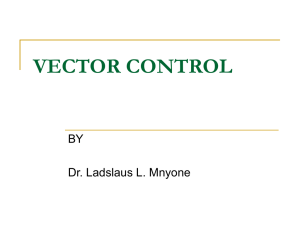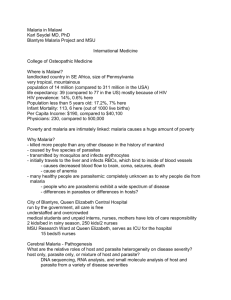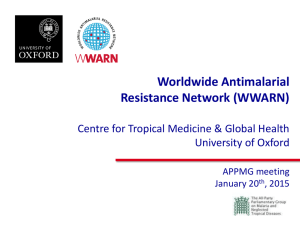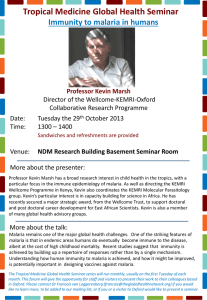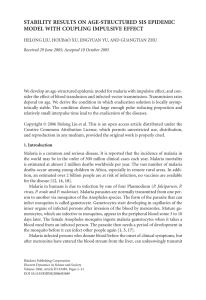Jenny Liu - Global Health Sciences
advertisement
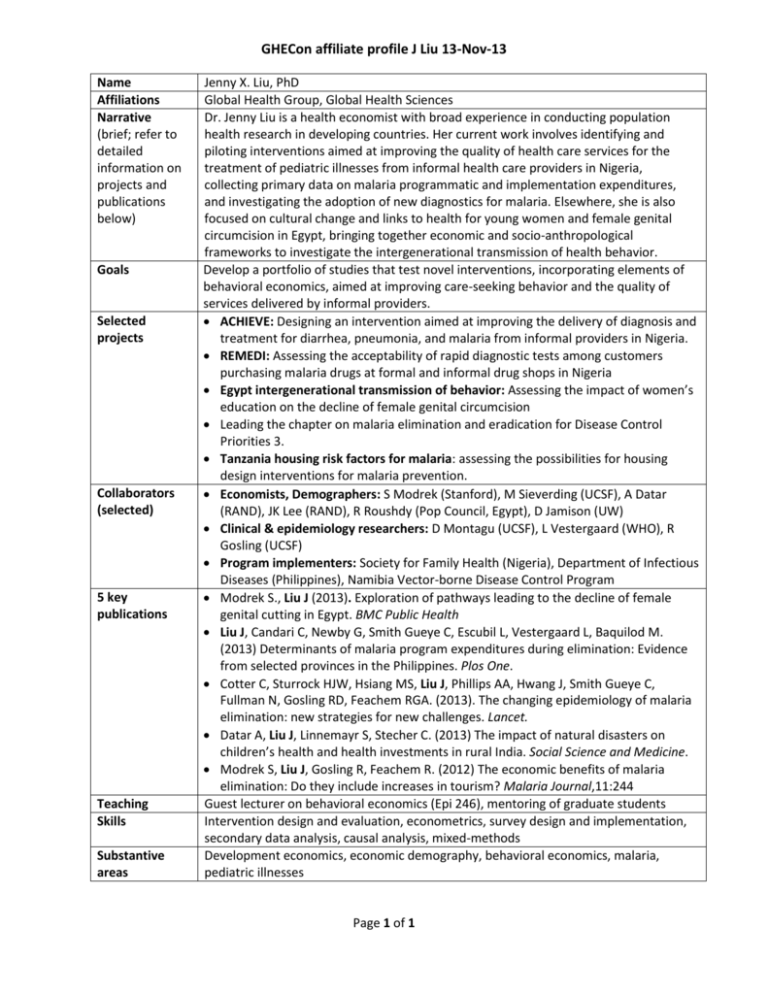
GHECon affiliate profile J Liu 13-Nov-13 Name Affiliations Narrative (brief; refer to detailed information on projects and publications below) Goals Selected projects Collaborators (selected) 5 key publications Teaching Skills Substantive areas Jenny X. Liu, PhD Global Health Group, Global Health Sciences Dr. Jenny Liu is a health economist with broad experience in conducting population health research in developing countries. Her current work involves identifying and piloting interventions aimed at improving the quality of health care services for the treatment of pediatric illnesses from informal health care providers in Nigeria, collecting primary data on malaria programmatic and implementation expenditures, and investigating the adoption of new diagnostics for malaria. Elsewhere, she is also focused on cultural change and links to health for young women and female genital circumcision in Egypt, bringing together economic and socio-anthropological frameworks to investigate the intergenerational transmission of health behavior. Develop a portfolio of studies that test novel interventions, incorporating elements of behavioral economics, aimed at improving care-seeking behavior and the quality of services delivered by informal providers. ACHIEVE: Designing an intervention aimed at improving the delivery of diagnosis and treatment for diarrhea, pneumonia, and malaria from informal providers in Nigeria. REMEDI: Assessing the acceptability of rapid diagnostic tests among customers purchasing malaria drugs at formal and informal drug shops in Nigeria Egypt intergenerational transmission of behavior: Assessing the impact of women’s education on the decline of female genital circumcision Leading the chapter on malaria elimination and eradication for Disease Control Priorities 3. Tanzania housing risk factors for malaria: assessing the possibilities for housing design interventions for malaria prevention. Economists, Demographers: S Modrek (Stanford), M Sieverding (UCSF), A Datar (RAND), JK Lee (RAND), R Roushdy (Pop Council, Egypt), D Jamison (UW) Clinical & epidemiology researchers: D Montagu (UCSF), L Vestergaard (WHO), R Gosling (UCSF) Program implementers: Society for Family Health (Nigeria), Department of Infectious Diseases (Philippines), Namibia Vector-borne Disease Control Program Modrek S., Liu J (2013). Exploration of pathways leading to the decline of female genital cutting in Egypt. BMC Public Health Liu J, Candari C, Newby G, Smith Gueye C, Escubil L, Vestergaard L, Baquilod M. (2013) Determinants of malaria program expenditures during elimination: Evidence from selected provinces in the Philippines. Plos One. Cotter C, Sturrock HJW, Hsiang MS, Liu J, Phillips AA, Hwang J, Smith Gueye C, Fullman N, Gosling RD, Feachem RGA. (2013). The changing epidemiology of malaria elimination: new strategies for new challenges. Lancet. Datar A, Liu J, Linnemayr S, Stecher C. (2013) The impact of natural disasters on children’s health and health investments in rural India. Social Science and Medicine. Modrek S, Liu J, Gosling R, Feachem R. (2012) The economic benefits of malaria elimination: Do they include increases in tourism? Malaria Journal,11:244 Guest lecturer on behavioral economics (Epi 246), mentoring of graduate students Intervention design and evaluation, econometrics, survey design and implementation, secondary data analysis, causal analysis, mixed-methods Development economics, economic demography, behavioral economics, malaria, pediatric illnesses Page 1 of 1

